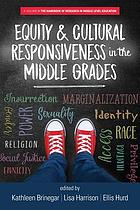
 Equity & cultural responsiveness in the middle grades
by
"While developmental responsiveness is a deservingly key emphasis of middle grades education, this emphasis has often been to the detriment of focusing on the cultural needs of young adolescents. This Handbook volume explores research relating to equity and culturally responsive practices when working with young adolescents. Middle school philosophy largely centers on young adolescents as a collective group. This lack of focus has great implications for young adolescents of marginalized identities including but not limited to those with culturally and linguistically diverse backgrounds, LGBTQ youth, and those living in poverty. If middle level educators claim to advocate for young adolescents, we need to mainstream conversations about supporting all young adolescents of marginalized identities. It empowers researchers, educators, and even young adolescents to critically examine and understand the intersectionality of identities that historically influenced (and continue to affect) young adolescents and why educators might perceive marginalized youth in certain ways. It is for these reasons that researchers, teachers, and other key constituents involved in the education of young adolescents must devote themselves to the critical examination and understanding of the historical and current socio-cultural factors affecting all young adolescents. The chapters in this volume serve as a means to open an intentional and explicit space for providing a critical lens on early adolescence-a lens that understands that both developmental and cultural needs of young adolescents need to be emphasized to create a learning environment that supports every young adolescent learner"-- Provided by publisher.
Equity & cultural responsiveness in the middle grades
by
"While developmental responsiveness is a deservingly key emphasis of middle grades education, this emphasis has often been to the detriment of focusing on the cultural needs of young adolescents. This Handbook volume explores research relating to equity and culturally responsive practices when working with young adolescents. Middle school philosophy largely centers on young adolescents as a collective group. This lack of focus has great implications for young adolescents of marginalized identities including but not limited to those with culturally and linguistically diverse backgrounds, LGBTQ youth, and those living in poverty. If middle level educators claim to advocate for young adolescents, we need to mainstream conversations about supporting all young adolescents of marginalized identities. It empowers researchers, educators, and even young adolescents to critically examine and understand the intersectionality of identities that historically influenced (and continue to affect) young adolescents and why educators might perceive marginalized youth in certain ways. It is for these reasons that researchers, teachers, and other key constituents involved in the education of young adolescents must devote themselves to the critical examination and understanding of the historical and current socio-cultural factors affecting all young adolescents. The chapters in this volume serve as a means to open an intentional and explicit space for providing a critical lens on early adolescence-a lens that understands that both developmental and cultural needs of young adolescents need to be emphasized to create a learning environment that supports every young adolescent learner"-- Provided by publisher.